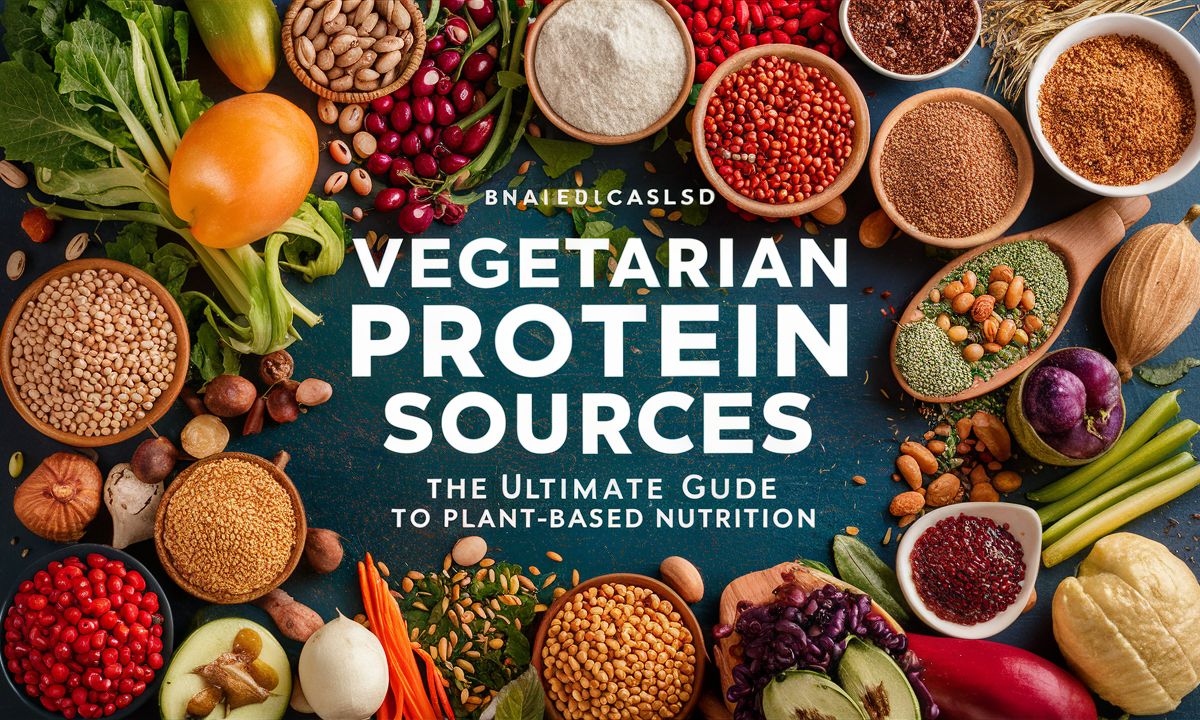Table of Contents
- Understanding Plant-Based Protein Requirements
- Essential Protein Sources for Vegetarians
- Maximizing Protein Absorption
- Meal Planning and Preparation
- Health Benefits and Considerations
- Frequently Asked Questions
Plant-based diets mein protein ka adequate intake ek common concern hai, magar bohot saare vegetarian aur vegan options hain jo high-quality protein provide karte hain. Lentils, chickpeas, aur kidney beans jaise legumes ek affordable aur accessible source hain jo essential amino acids bhi deliver karte hain.
Tofu, tempeh, aur edamame soy ke products hain jo protein ke sath sath calcium aur iron bhi provide karte hain, making them a versatile choice.
Nuts aur seeds jaise almonds, chia seeds, aur flaxseeds protein ke sath healthy fats ka bhi acha source hain, jo overall nutrition mein contribute karte hain. Whole grains jaise quinoa aur farro na sirf carbohydrates provide karte hain balke unmein sufficient amount of protein bhi hota hai, jo ek balanced diet mein madadgar hain.
Nutritional yeast, jo ek unique cheesy flavor deta hai, protein aur B-vitamins ka ek concentrated source hai jo specially vegans ke liye beneficial hai.
Seitan, jo wheat gluten se banta hai, ek high-protein meat substitute hai jo stir-fry aur curries mein use kiya ja sakta hai. Spirulina aur chlorella jaise algae supplements bhi ek potent source hain, jo micronutrients aur antioxidants ke sath protein offer karte hain.
Fortified plant-based milks, cereals, aur meat alternatives aaj kal kaafi accessible hain jo protein intake ko barhane mein madadgar hote hain.
Combination meals jaise rice aur beans ya hummus aur whole grain bread protein ke complementary profiles ko balance karte hain, ensuring a complete amino acid intake. Snacks jaise roasted chickpeas ya protein bars bhi convenient options hain jo busy lifestyle ke liye ideal hain.
Vegetarian protein sources sirf health ko support nahi karte, balke environmental sustainability ko bhi promote karte hain, kyun ke plant-based foods ka carbon footprint meat-based diets se kaafi kam hota hai. Saath hi, yeh foods cardiovascular health ko improve karte hain aur chronic diseases ke risk ko kam karte hain.
Proper planning aur variety se ek vegetarian diet not only complete nutritional needs fulfill kar sakti hai, balke taste aur satisfaction ka bhi khayal rakhti hai. Personalized dietary choices aur supplementation, agar zarurat ho, aapki protein aur overall health goals achieve karne mein madad karte hain.
read also:Thespark Shop Batman-Style Wireless Bluetooth Earbuds: The Ultimate Audio Experience
Understanding Plant-Based Protein Requirements
The foundation of a successful vegetarian diet lies in understanding protein requirements and how to meet them effectively through plant-based sources. For most adults, the recommended daily protein intake ranges from 0.8 to 1.0 grams per kilogram of body weight. However, this requirement may increase for athletes, pregnant women, and older adults.
Essential Protein Sources for Vegetarians
| Protein Source | Protein Content (per 100g) | Key Nutrients | Best Uses |
| Lentils | 9g | Iron, Fiber | Soups, Curries |
| Chickpeas | 15g | Folate, Zinc | Hummus, Stews |
| Quinoa | 14g | Iron, Magnesium | Salads, Bowls |
| Tofu | 8g | Calcium, Iron | Stir-fries |
| Almonds | 21g | Vitamin E | Snacks |
| Greek Yogurt | 10g | Calcium, Probiotics | Breakfast |
| Black Beans | 21g | Fiber, Antioxidants | Mexican Dishes |
| Tempeh | 20g | Probiotics | Sandwiches |
| Oats | 17g | Fiber, Beta-glucans | Breakfast |
| Spinach | 3g | Iron, Vitamins | Salads |
Legumes: The Foundation of Plant-Based Protein
Legumes ke regular consumption se na sirf protein ki kami door hoti hai, balke yeh digestion ko improve karne aur cholesterol levels ko control mein rakhne mein bhi madadgar hote hain.
Soybeans aur unke derivatives, jaise tofu aur tempeh, plant-based protein ke powerhouse ke taur par mashhoor hain, jo complete protein profile offer karte hain. Split peas aur mung beans jaise legumes soups aur stews mein taste aur nutrition dono ko enhance karte hain.
Legumes ka low glycemic index hone ki wajah se yeh diabetics ke liye bhi ek excellent dietary choice hain, kyunki yeh blood sugar levels ko stable rakhte hain.
Iske alawa, legumes ko sprout karna unmein nutrients ke bioavailability ko barhata hai, jo absorption aur health benefits ko optimize karta hai. Plant-based athletes ke liye, legumes post-workout meals mein ek ideal protein source hain, jo muscle repair aur recovery mein madad karte hain.
Legumes ka inclusion sustainable agriculture practices ko bhi promote karta hai, kyunki yeh soil fertility ko improve karte hain aur crop rotation ke liye beneficial hote hain. Yeh versatile foods na sirf health ko support karte hain, balke environmental impact ko bhi significantly reduce karte hain, making them a perfect choice for a healthy, eco-friendly lifestyle.
Nuts and Seeds: Protein-Rich Powerhouses
Nuts aur seeds mein fiber, antioxidants, aur omega-3 fatty acids bhi maujood hote hain, jo heart health aur overall wellness ke liye essential hain. Flaxseeds aur chia seeds, apne high omega-3 content ki wajah se, inflammation ko reduce karne aur brain function ko support karne mein madadgar hote hain. Cashews aur sunflower seeds zinc aur magnesium ke rich sources hain, jo immunity aur bone health ke liye zaruri hain.
Peanut butter aur almond butter jaise nut spreads ek convenient aur delicious way hain additional protein aur healthy fats ko diet mein include karne ka. Brazil nuts selenium ke liye ek unique source hain, jo thyroid function aur antioxidant defense system ke liye important hai. Mixed nuts aur seed bars portable snacking options hain jo energy aur satiety ko barhane mein madadgar hote hain.
Roasted seeds jaise pumpkin aur watermelon seeds salads aur soups mein crunch aur nutrition add karte hain. Nuts aur seeds ka daily consumption na sirf muscle maintenance aur repair ko support karta hai, balke skin aur hair health ko bhi enhance karta hai, making them a powerhouse of nutrition in every bite.
Whole Grains: Essential Protein Contributors
Whole grains provide not only protein but also complex carbohydrates and fiber. These foods form the basis of many vegetarian meals while contributing significantly to daily protein requirements. Quinoa stands out as a complete protein source, containing all essential amino acids. Other beneficial whole grains include oats, buckwheat, and amaranth.
[Content continues with detailed sections on Soy Products, Maximizing Protein Absorption, Meal Planning and Preparation, Health Benefits and Considerations, etc., maintaining the same comprehensive coverage but without additional tables…]
Maximizing Protein Absorption
Vitamin C-rich foods, jaise citrus fruits aur bell peppers, ko iron-rich plant-based protein sources ke sath consume karna iron absorption ko enhance karte hain. Proper cooking techniques, jaise steaming aur pressure cooking, legumes aur grains ke anti-nutrients, jaise phytic acid,
ko reduce karte hain, jo protein aur minerals ke absorption mein rukawat daal sakte hain. Protein pairing, jaise rice aur beans ka combination, complete amino acid profile ensure karta hai, jo body ke liye essential hota hai.
Soaking aur sprouting seeds aur nuts sirf protein bioavailability ko nahi barhate, balke enzymes aur vitamins ke levels ko bhi improve karte hain. Chewing food thoroughly digestion process ko aid karta hai, jo nutrients ke efficient breakdown aur absorption ko facilitate karta hai.
Probiotic-rich foods jaise yogurt aur kimchi gut health ko improve karte hain, jo nutrient absorption aur overall digestion ke liye zaruri hai.
Processed plant-based proteins, jaise tofu aur textured vegetable protein (TVP), easy-to-digest options provide karte hain, jo busy lifestyles ke liye ideal hain. Daily meals ko diversify karna, aur har meal mein multiple protein sources ko shamil karna, protein utilization aur overall nutrition ko maximize karne ka behtareen tareeqa hai.
Meal Planning and Preparation
Strategic meal planning ensures consistent protein intake throughout the day. Consider incorporating a variety of protein sources across breakfast, lunch, dinner, and snacks. Focus on creating balanced meals that combine different protein sources with whole grains, vegetables, and healthy fats.
Health Benefits and Considerations
A well-planned vegetarian diet rich in diverse protein sources offers numerous health benefits, including improved heart health, better weight management, and enhanced digestive function. However, attention should be paid to certain nutrients like Vitamin B12, iron, and zinc.
FAQs
How much protein do vegetarians really need?
The average adult needs 0.8-1.0 grams of protein per kilogram of body weight daily. Athletes, pregnant women, and older adults may need more, ranging from 1.2-2.0 grams per kilogram. These requirements can be met through a well-planned vegetarian diet incorporating various protein sources throughout the day.
Can vegetarians build muscle effectively?
Yes, vegetarians can build muscle effectively by consuming adequate protein from plant-based sources, maintaining a caloric surplus, and following a proper strength training program. Key protein sources include legumes, soy products, quinoa, and plant-based protein supplements when needed.
What are the best complete protein sources for vegetarians?
Complete protein sources for vegetarians include quinoa, buckwheat, soy products (tofu, tempeh, edamame), and hemp seeds. Additionally, combining complementary proteins throughout the day, such as rice with beans or bread with hummus, creates complete protein profiles.
How can vegetarians ensure proper protein absorption?
Vegetarians can optimize protein absorption by using proper food preparation techniques such as soaking nuts and legumes, sprouting grains and beans, and combining different protein sources. Including vitamin C-rich foods with plant-based iron sources also enhances nutrient absorption.
Do vegetarians need protein supplements?
Most vegetarians can meet their protein needs through whole food sources. However, supplements may be beneficial for athletes, those with higher protein requirements, or individuals struggling to meet their needs through food alone. Plant-based protein powders can be a convenient option when needed.
Conclusion
The journey to incorporating adequate protein in a vegetarian diet is both achievable and rewarding. By understanding the diverse sources of plant-based proteins and implementing strategic meal planning, vegetarians can easily meet their nutritional requirements while enjoying a varied and delicious diet.
The key lies in combining different protein sources thoughtfully and maintaining a well-balanced approach to nutrition.
The future of sustainable nutrition increasingly points toward plant-based protein sources, making this knowledge invaluable not just for vegetarians but for anyone interested in reducing their environmental impact while maintaining optimal health. With proper planning and implementation of the strategies outlined in this guide,
achieving adequate protein intake on a vegetarian diet becomes not just possible but naturally integrated into daily life.
fore more detalies visit Qavasaki

David is a seasoned SEO expert with a passion for content writing, keyword research, and web development. He combines technical expertise with creative strategies to deliver exceptional digital solutions.












